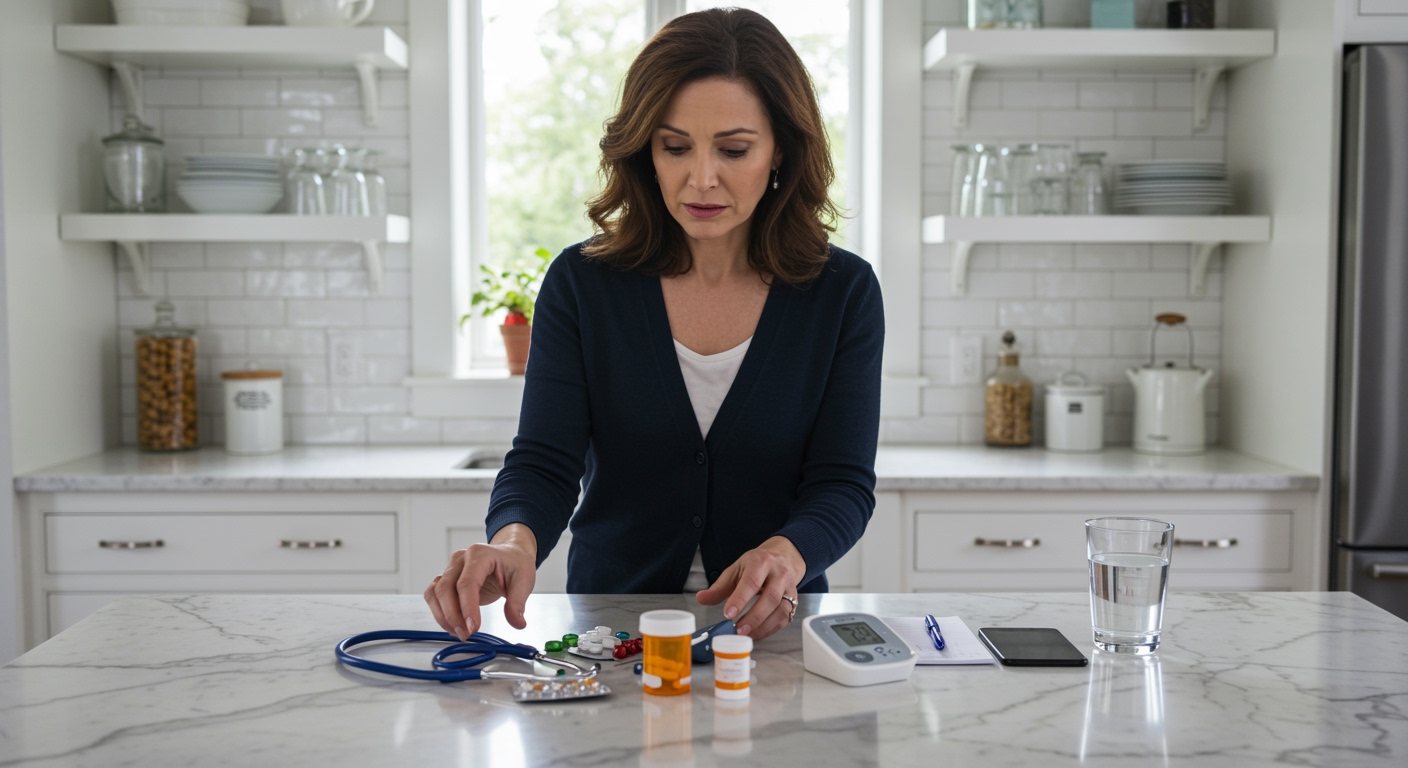✪ Key Takeaway: Yes, blood pressure medications can lower your numbers dangerously, causing dizziness, falls, and organ damage.
Introduction
Your doctor prescribed blood pressure medication to protect your heart, but what if that same medication is putting you at risk?
You might be wondering about this because you feel dizzy when standing up, experience unusual fatigue, or worry about taking multiple medications together.
Hi, I’m Abdur, your nutrition coach, and today I’m going to explain how certain medications can indeed lower your blood pressure too much and what you need to know to stay safe.
What Happens When Blood Pressure Drops Too Low?
When your blood pressure falls below 90/60 mmHg, your body struggles to deliver enough oxygen and nutrients to vital organs.
Your brain needs constant blood flow to function properly, and even a small drop can cause dizziness, confusion, or fainting.
Your kidneys also suffer when blood pressure drops too low because they cannot filter waste effectively from your blood.
The heart tries to compensate by beating faster, but this creates additional strain on an already stressed cardiovascular system.
Low blood pressure, or hypotension, can be just as dangerous as high blood pressure because it disrupts the delicate balance your body needs to survive.
Many people dismiss symptoms like fatigue or lightheadedness as normal aging, but these could be warning signs of medication-induced hypotension.
✪ Fact: Falls from medication-induced low blood pressure send over 125,000 Americans to emergency rooms annually.
Which Medications Cause Dangerous Blood Pressure Drops?
ACE inhibitors and ARBs are common culprits because they relax blood vessels sometimes more than intended.
Diuretics, often called water pills, can cause dehydration that leads to sudden pressure drops when you stand up.
Beta-blockers slow your heart rate and can make it difficult for your body to respond to position changes.
Calcium channel blockers relax blood vessels but can sometimes work too well, especially in older adults whose blood vessels are already less elastic.
The danger increases when doctors prescribe multiple medications together without carefully monitoring the combined effects.
Even non-blood pressure medications like antidepressants, pain relievers, and prostate medications can interact with your blood pressure drugs to create dangerous drops.
✪ Pro Tip: Always tell every doctor about all medications you take, including over-the-counter drugs and supplements.
Who Is Most At Risk For Medication-Induced Low Blood Pressure?
Adults over 65 years old face the highest risk because their bodies process medications differently and blood vessels become less flexible with age.
People with diabetes often experience blood pressure swings because their condition affects blood vessel function and medication absorption.
Those taking multiple medications for different conditions create a perfect storm for drug interactions that can cause dangerous pressure drops.
Individuals who are dehydrated or have kidney problems cannot regulate blood pressure as effectively, making them more vulnerable to medication effects.
People who recently started new medications or had dosage changes need extra monitoring because their bodies are still adjusting to the effects.
Those with a history of fainting or dizziness should be especially cautious because they may already have underlying blood pressure regulation problems.
✪ Note: Frail elderly patients may experience more harm than benefit from aggressive blood pressure treatment.
What Are The Warning Signs You Should Never Ignore?
Dizziness when standing up quickly is often the first sign that your blood pressure is dropping too low.
Unusual fatigue or weakness that seems to come from nowhere could indicate that your organs are not getting enough blood flow.
Blurred vision or difficulty concentrating happens when your brain does not receive adequate oxygen-rich blood.
Nausea or feeling like you might vomit can occur when low blood pressure affects your digestive system.
Cold, clammy skin indicates that your body is struggling to maintain proper circulation and temperature regulation.
Rapid, shallow breathing or a fast heartbeat shows that your cardiovascular system is working overtime to compensate for low pressure.
✪ Pro Tip: Keep a symptom diary to track when you feel dizzy or weak in relation to taking your medications.
How Can You Protect Yourself From Dangerous Blood Pressure Drops?
Monitor your blood pressure at home regularly, especially when starting new medications or changing dosages.
Stand up slowly from sitting or lying positions to give your body time to adjust and prevent sudden pressure drops.
Stay properly hydrated by drinking water throughout the day, but avoid excessive amounts that could dilute your blood too much.
Take medications exactly as prescribed and never skip doses or double up, as this can cause dangerous fluctuations.
Communicate openly with your doctor about any symptoms you experience, no matter how minor they seem.
Consider working with a pharmacist to review all your medications for potential interactions that could affect blood pressure.
Make lifestyle changes like eating regular meals and avoiding alcohol, which can worsen blood pressure drops caused by medications.
✪ Note: Your target blood pressure may need adjustment based on your age, health conditions, and risk factors.
The Bottom Line
Blood pressure medications can indeed lower your numbers too much, creating serious health risks that require careful monitoring and management.
The goal is not just lower numbers, but the right numbers for your individual health needs and circumstances.
I encourage you to share your experiences with blood pressure medications in the comments below, and let me know if you have questions about managing your blood pressure safely.
References
At NutritionCrown, we use quality and credible sources to ensure our content is accurate and trustworthy. Below are the sources referenced in creating this article:
- NIHR Evidence: Blood pressure treatment: the risks may be as great as the benefits in older people with frailty
- PMC: Hypotension and adverse outcomes in emergency department patients
- NCBI Books: Hypotension
- AHA Journals: Blood Pressure Lowering Treatment Trialists Collaboration
- PMC: Medication-related falls in older adults





